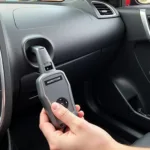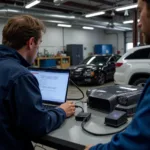The dreaded check engine light glowing on your dashboard is never a welcome sight. And when you hook up your OBD2 scanner and see the code P0307 staring back at you, it’s easy to feel a sense of dread. P0307 signifies a cylinder 7 misfire, which, while a common engine issue, can be caused by a range of problems, from something as simple as a faulty spark plug to more complex issues like a vacuum leak or a faulty fuel injector.
This comprehensive guide will delve into everything you need to know about OBD2 code P0307, including its causes, common symptoms, how to diagnose it, and the most effective ways to fix it.
Understanding OBD2 Code P0307
Your car’s engine operates through a precise sequence of combustion events happening in each cylinder. A P0307 code specifically indicates that the engine control module (ECM) has detected a misfire in cylinder 7. This means that the air-fuel mixture in that cylinder is not igniting properly or at the right time.
Ignoring this code can lead to further engine damage and costly repairs down the line.
Common Symptoms of P0307 Code
While the check engine light is the most obvious indicator, several other symptoms can point towards a P0307 code:
- Rough Engine Idle: One of the first signs you’ll notice is a rough idle when your car is stopped, almost feeling like it’s about to stall.
- Engine Misfires: You might feel the engine stuttering or jerking, especially during acceleration.
- Reduced Engine Performance: A noticeable decrease in your car’s power and acceleration can occur.
- Increased Fuel Consumption: Your car might start guzzling more fuel than usual as it struggles to compensate for the misfiring cylinder.
- Strong Gasoline Smell: A noticeable smell of gasoline from the exhaust could indicate incomplete combustion.
What Causes a P0307 Code?
A P0307 code can be triggered by various culprits, each requiring a different approach to fix:
- Worn Spark Plugs: One of the most common and easiest to fix is a worn-out spark plug in cylinder 7. Spark plugs wear down over time and lose their ability to create a strong spark.
- Faulty Ignition Coils: The ignition coil provides the high voltage necessary for the spark plug to ignite the air-fuel mixture. A failing coil can lead to weak or inconsistent sparks.
- Vacuum Leaks: Any leaks in the vacuum system can disrupt the air-fuel mixture, causing misfires.
- Faulty Fuel Injectors: A clogged or malfunctioning fuel injector can disrupt the fuel supply to cylinder 7, leading to an improper air-fuel ratio.
- Compression Issues: Low compression in cylinder 7, perhaps due to worn piston rings or a blown head gasket, can prevent proper combustion.
Less common but possible causes include issues with the engine control unit (ECU), wiring problems, or even poor fuel quality.
Diagnosing a P0307 Code
While a P0307 code specifically points to cylinder 7, it’s crucial to perform a thorough diagnosis to pinpoint the exact cause of the misfire:
- Visual Inspection: Start by visually inspecting the spark plugs, ignition coils, and wiring for any visible damage, wear, or loose connections.
- Spark Plug Test: Remove the spark plug from cylinder 7 and inspect it for signs of wear, fouling, or damage. Consider replacing it, especially if it shows signs of wear.
- Ignition Coil Swap: Swap the ignition coil from cylinder 7 with another cylinder. If the misfire code changes to the cylinder where you moved the coil, you’ve identified a faulty coil.
- Fuel Pressure Test: Check the fuel pressure to ensure the fuel pump and fuel filter are working correctly and delivering adequate pressure.
- Compression Test: A compression test on cylinder 7 will help determine if there are any mechanical issues affecting compression, such as a blown head gasket or worn piston rings.
How to Fix a P0307 Code
The best fix for a P0307 code depends entirely on the underlying cause identified during the diagnosis process. Here’s a breakdown of potential fixes for each common cause:
- Worn Spark Plugs: Replace all spark plugs as part of regular maintenance, even if only one appears faulty.
- Faulty Ignition Coils: Replace the faulty ignition coil.
- Vacuum Leaks: Inspect all vacuum hoses and components for leaks and repair or replace as needed.
- Faulty Fuel Injectors: Clean or replace the malfunctioning fuel injector.
- Compression Issues: Addressing compression issues might involve more extensive repairs, such as replacing piston rings or even rebuilding the engine.
It’s always recommended to address the simplest and most common causes first, such as spark plugs and ignition coils, before moving on to more complex diagnoses and repairs.
Expert Insights
“While a P0307 code can seem daunting, it’s important to remember that it’s a relatively common engine issue,” says John Miller, senior automotive engineer at Car Diagnostics Pro. “Timely diagnosis and repair are crucial to prevent further engine damage. Using a quality OBD2 scanner and following a systematic approach can help you pinpoint the problem and get your car back on the road quickly.”
Conclusion
A P0307 code, indicating a cylinder 7 misfire, can be caused by various issues, ranging from simple spark plug problems to more complex fuel system or compression issues. While it might seem intimidating, understanding the code, recognizing its symptoms, and following a structured diagnostic approach can save you time, money, and potential headaches. Remember, using a reliable OBD2 scanner and seeking professional help when needed can make all the difference in getting your car back to its optimal performance.

